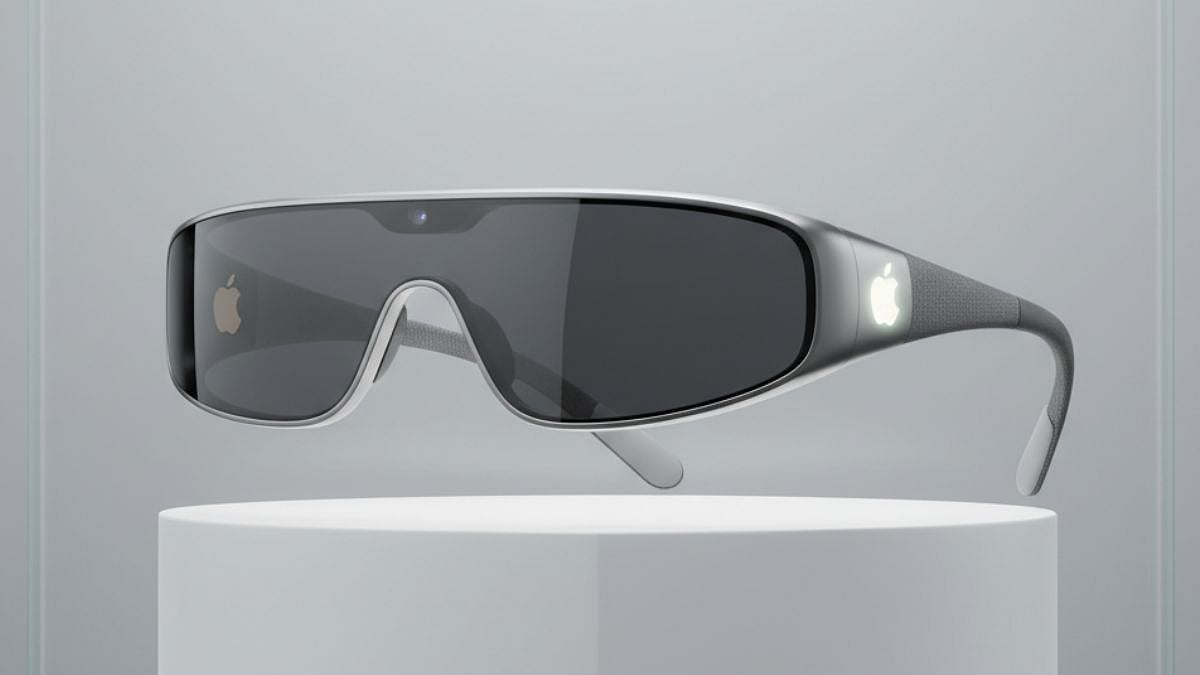Apple Pivots To Smart Glasses To Compete With Meta, Reportedly Deprioritises 'Vision Air' Headset
The tech giant is reportedly pivoting from its high-end Vision Pro headset toward lighter, AI-powered smart glasses, leveraging its vast ecosystem to challenge Meta's early lead in the segment.

AI generated concept image of Apple smart glasses of the future |
With AI-enhanced wearables like Meta's Ray-Ban glasses seeing rapidly expanding sales and signaling a broader shift away from bulky VR headsets, the smart glasses market is poised for explosive growth—making Apple's rumored entry a potential game-changer for consumers and rivals alike.
The tech giant is reportedly pivoting from its high-end Vision Pro headset toward lighter, AI-powered smart glasses, leveraging its vast ecosystem to challenge Meta's early lead in the segment. This strategic move comes as VR adoption lags, with only an estimated 1-2 million units of Meta's Quest 3 in use two years post-launch, compared to the surge in affordable, everyday AI eyewear.
Apple's Pivot: From Vision Pro to Everyday AI Glasses
Apple's focus on smart glasses represents a significant departure from its initial AR/VR ambitions. Internal reports suggest the company is deprioritising a 'Vision Air' lightweight headset in favor of Meta-style glasses that integrate AI features, drawing on the Vision Pro's software foundations for seamless iPhone and Mac compatibility. This shift is fueled by the VR market's contraction and the rising appeal of glasses-form wearables, where users are already comfortable with frames costing hundreds of dollars—easing the path for AI upgrades without the privacy pitfalls that doomed Google Glass over a decade ago.
Dual UIs: A Smarter, Adaptive Experience
At the heart of Apple's vision are innovative user interfaces tailored to different devices. The glasses are expected to run the full version of visionOS—the operating system powering the Vision Pro—when paired with a Mac, delivering a robust AR experience for productivity and creative tasks. Switch to an iPhone connection, however, and it shifts to a lighter, mobile-optimised interface for on-the-go use, such as quick AI queries or notifications. This dual-UI approach could set Apple's offering apart, emphasising ecosystem integration that Meta's glasses currently lack.
Apple's rumoured smart glasses: Timeline and Launch Outlook
While exact release dates remain under wraps, the plans surfaced in reports just last week, hinting at accelerated development amid the market's momentum. Apple could tap its established supply chains and manufacturing prowess—honed through millions of Apple Watches—to bring these glasses to market swiftly, potentially disrupting the segment before Meta solidifies its position further.
Heightened Competition: A Threat to Meta's Dominance
Meta, which commands 77 percent of the VR headset market, now faces stiffer rivalry in the faster-growing AI glasses arena. Its Ray-Ban partnership has driven impressive uptake for camera-equipped models priced over $400, but Apple's advantages include global retail demos, app ecosystem synergies, and a track record of mass-producing wearables. Analysts warn that if Apple captures significant share, it could upend Meta's metaverse ambitions, leaving the social media giant without a clear fallback in spatial computing.
RECENT STORIES
-
-
-
-
-